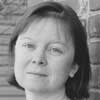|
Harvest
All week long, the rain piles up dark
behind the mountains, showing itself
to us in fits and starts over the ridge
like an army waiting to invade, bolder
and bolder as reinforcements arrive
to bolster it from behind. We work
from dark to dark, even in sleep
grain slips like water through my fingers,
pours out the corners of the pouch
I try to make from my skirt, the ache
of my back rolls into dream as thunder's
low groan.
It is night
when we finish. Lentils and grain
bulge in their sacks, for once enough—
that word passes through the field
like a waterskin hand to hand, loosens
our breath, our shoulders, unknots
faces that for days on end have twisted
with work and worry, hurry and work.
We gather at the cookfire set up
in the low field. I sit on one side,
Rachel and Jacob on the other, leaning
into each other like those sacks of grain.
The rest of the household settling around,
children hiding at the edges,
jumping out to scare each other
in the dark.
Except for Judah,
my Judah, six now and old enough
this year to help—so important,
so serious he was, carrying empty sacks
to us in the fields. His hard work
done now, he trails a stick in the dust
around and around the fire, singing
his own small song about fields
and beans and dirty knees. When he thinks
to look up, he sees me, his father,
Rachel, his grandmother, all eyes
on him—my beautiful,
beautiful boy—holding him there
at the center, by the fire that softens
even the hard pebbles of lentils
and makes them possible,
softens even the hard shell
of Rachel's eyes, that inner lid that closes
when my children come near, as though
to see them were to see a horror,
a shape of emptiness she could
never fill.
But tonight, Judah circles
and he sees that we see him, we hold him
there in the warm, lit place, and his song begins
to grow, begins to spin out from the fire
like a swirl of sparks up into the dark, so unafraid
his joy in the moment I fear I will have to
turn away.
He stops,
shining, in front of me and I catch
my breath, he is about to speak, oh,
what can be the words for such
as this?
Mother,
—he says, and I see
only the knot of his two hands
holding each other so tightly
over his heart that his whole
small body tenses and shakes—
I am right here.
And for this moment, it all goes quiet—the fire,
all the rustling and talk around it, Jacob laughing,
the thunder gathering itself behind the mountains,
the children making each other scream in the dark.
|
